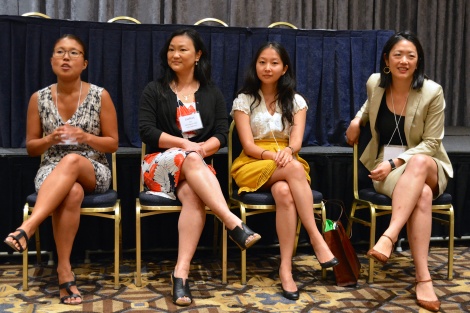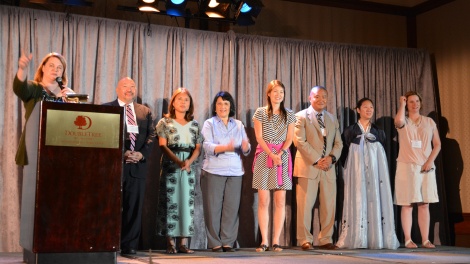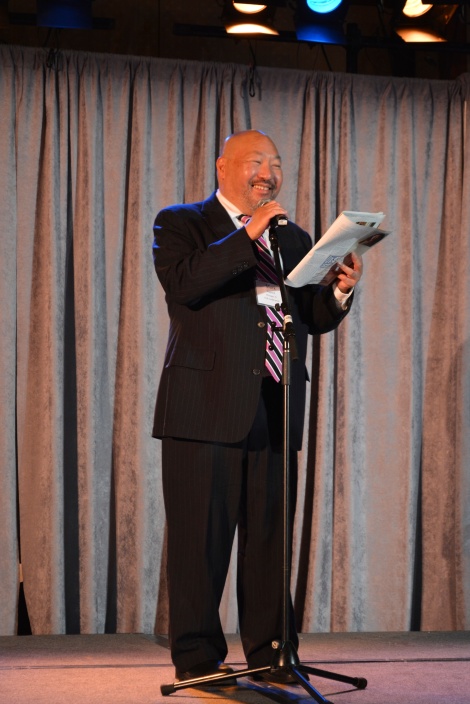This past weekend I was lucky enough to be a volunteer and panelist at the KAAN (Korean Adoptee and Adoptive Family Network) Conference in Minneapolis, Minnesota. I first came across this event through the Land of Gazillion Adoptees facebook page, however it was looking at the sessions and speakers list that solidified my desire to attend the conference. I was apprehensive about attending because I am not a Korean adoptee, but my fears were unneeded. Though I had to do some extra introduction, distinguishing myself as a Chinese adoptee, everyone was very welcoming and pleased to see me there.
One of my favorite parts of these large adoptee gatherings is, of course, meeting new people. I love engaging with adoptees on their thoughts, perceptions, and experiences around adoption, but also learning about their professional work and interests outside of adoption. It reminds me that we are whole people with so many layers to our identities, and that adoptees are making some really outstanding accomplishments. I am also so hopeful when I see loving parents, partners, and siblings with open minds and hearts attending so they can better understand and support their adoptee loved one. The last group of people I look forward to meeting are all of the strangers who don’t feel strange. Bloggers, scholars, and writers who I follow in the online world come to life through these conferences, and I can see for myself that they are so much more than meaningful words on a screen. They are real! (Adoptee fangirl moments included seeing JaeRan Kim, Sarah Park Dahlen, Rosita Gonzalez, Martha Crawford, and Margie Perscheid among others)
I also love knowing that I will leave the conference with more knowledge than I had at the beginning. My first panel discussed cross country commonalities for adoptees as well as the challenges to uniting adoptees as a whole, including differences in access to records, how we process homeland returns, trauma, birth searches, communities of color, and others. I think the bottom-line take away point from this workshop was that there is no monolithic way of being an [insert type] adoptee, and that we all seek validation of our experiences.

Transracial Adoptees: Finding Commonalities Across Countries – Adam Chau, JaeRan Kim MSW, LGSW, Sumitra Dorner LICSW, and Stephanie Kripa Cooper-Lewter PhD, LMSW — “As the authors of the book Parenting as Adoptees have shown, adult transracial international adoptees have a huge amount in common, wherever they were born. Identity, birth search, the narrative burden, and other issues all present common challenges. Adoptees from Colombia, India, Vietnam, and South Korea will lead a discussion of common issues.”
My next discussion was on adoptee scholarship. The speakers were all relatively junior scholars because senior scholars tend to be adoptive parents. It was interesting to hear the questions directed towards adoptees in academia that weren’t asked of adoptive parents like, “are you biased because you’re an adoptee?” I can’t imagine how exhausting it must be to constantly be challenged about their work. These scholars also talked about the obstacles for women of color in higher education and the idea of having to do research on a designated topic but additional research on how women of color are treated in higher education when defending their inevitably lower reviews.

Perspectives from the Inside: Adoptee Scholars and Adoption Research – Kimberly McKee PhD, JaeRan Kim MSW, LGSW, Oh Myo Kim PhD, and Elizabeth Raleigh — “This roundtable discussion features adult adoptee researchers in the fields of History, Psychology, Sociology, Social Work, and Gender Studies. Panelists will discuss how they negotiate their locations as adoptees and researchers in their work on transracial, domestic, and/or international adoption. They will reflect on how their scholarship is considered by non–adoptees in academia and consider how adult adoptee scholars are impacting mainstream understandings of adoption.”
I also went to a session on not finding birth family. This very real possibility is one that I am preparing myself for as I begin a birth parent search. Given China’s circumstances of street abandonment and having no information about my first family at all, I know I need to be realistic. Though I will always remain hopeful, I can find peace in knowing that regardless of the outcome of my search, I will be coming closer to my roots.

Not Finding Birth Family – Kim Ok Soon and Dawn Tomlinson — “The popular environment for discussion weighs heavily toward the adoptee who reconnects with birth family. But what about the adoptees who decide to search and cannot find the birth family? How does this impact relationships with their adopted family, their friends, and themselves? Kate and Dawn speak to their own stories.”
The last panel I attended was on the topic of DNA testing. This is something that a few of my friends have considered, but I feel that I need to know more about it before I would do it. Genetic counselors and an adoptee discussed medical and personal factors to consider. While 23&Me, Ancestry.com, and others provide DNA testing for a relatively low price, what happens after receiving the genetic information? How does one process the newfound information when most physicians wouldn’t know how to explain it? And considering how few Koreans (or in my case Chinese) are in the database, how accurate are the results? While I know my genome sequence doesn’t define who I am, it is certainly something that fascinates me. Birth privilege is having a family medical history and having an ancestral lineage, and DNA testing may be able to provide some (but not all) answers.

Family Ties: How DNA Tests Work – Heewon Lee, Richard M. Lee PhD, LP, Bonnie S. LeRoy MS, CGC, Mary Jarvis Ahrens MS, CGC — “Genetic testing is a method of finding medical and birth family history. The purpose of this session is to learn about research and trends, discover which tests are best to take, understand how to interpret results and listen to stories about the process of taking the tests and finding relatives.”
This conference has been one of the highlights of my summer so far. While there, I felt this profound sense of belonging and community – yet it was a community not quite my own. Sure, we have similar beginnings to our life stories and can relate to the idea of trying to learn to be Asian from non-Asian parents, but the roots of adoption from the respective countries are distinctly separate issues. Additional differences are that I can’t apply to GOA’L for help on my birthparent search, and I’ve never had anyone ask me if I was North Korean. I see so much value in having transnational conversations on adoption and connecting with adoptees from all over, but speaking honestly, being in such an intimate space with a nearly all Korean adoptee presence made me crave and long for an organization of adult Chinese adoptees who are engaged with adoption discourse and thinking critically about our roots.
I am a member of several online communities for Chinese teen/young adult adoptees or families with adoptees from China. These virtual groups can’t alleviate my desire to feel again this inextricable sense of belonging in the same way conferences allow. I know that the Chinese adoptee community is so young and unorganized compared to our older Korean adoptees. I think, however, we can learn much from them in regards to coming together on critical social and political issues, attempting to challenge the mainstream views of adoption, and becoming a support network for each other. I think about the sophistication of Korean adoptee groups including TRACK, KAAN, KoRoot, KUMFA, GOA’L, and ASK, and have faith that rising Chinese adoptees will soon join the adoptee movement.
The theme of this year’s KAAN2014 Conference was: “The time is now.” I believe this message applies to adult Chinese adoptees, as well. Let’s get organized.
More photos from the KAAN Conference:

Keynote: Is Asian Adoption Less of a Transracial Adoption? Racial Hierarchies in a Post-Racial World – Elizabeth Raleigh — “Between 1999 and 2011, 43% of all children adopted from overseas to the United States were Asian. Explaining this trend, one adoption social worker said that white parents seemed to feel that adoptions from Asia were “less of a transracial adoption.” How do we make sense of this? Drawing on her research interviewing adoption providers, Liz Raleigh will explore how racial hierarchies in adoption play out in a supposedly post-racial world.”

Connect-A-Kid: “Connect-A-Kid is a mentorship program that pairs adopted children with adult-adoptee mentors. Through this program, children will have an opportunity to interact with others whom they can relate to and look to for advice within a safe and comfortable community.”

Mayda Miller






Thanks so much for sharing your experiences at KAAN. We haven’t attended, but I always watch the speakers and topics and use that information to learn as an AP to a now 15 year old adopted from China.
I really hope that the China adoption community forms up the way the Korean adoption community has with KAAN to empower adoptees to speak their truths and meet/support each other. I don’t know what the appropriate role is for APs, but I would certainly support this effort however is needed.
LikeLike
There have been rumors of a Chinese adoptee conference in the next year!
LikeLike
In a mentorship program for high school Chinese adoptees, we attended an adult Korean adoptee event. They had the same idea, a desire for a Chinese organization like AKA or KAAN. It is interesting to see how different generations of adoptees interact with each other. I believe personally that there should be less emphasis on ethnic differences and more emphasis on the similarities, but that is difficult to do when ethnic pride is so strong. Just some thoughts from another adoptee (not chinese or korean, more of an “other”)
LikeLiked by 1 person
Jason, I think these intimate spaces for [insert type] adoptee are important, but I agree that there should be more overarching support for the adoptee community at large. I think if unified, we could do some remarkable things.
LikeLike
Adoptees of any race or ethnicity are welcome at KAAN – as are transracially adoptive parents. There is a great deal to learn from adoptees who have lived this over the past 50 years.
Sorry we didn’t get a chance to meet directly! I admire your reflections here so much.
LikeLiked by 1 person
Thanks! Maybe we’ll meet at another conference!
LikeLiked by 1 person
thanks for this insight!
one comment, while TRACK, GOA’L, and ASK are Korean adoptees organizations, KAAN, KoRoot, KUMFA are not. For me KAAN is not, because it includes adoptive families and its leadership is shared.
LikeLike
Good correction – the point I was trying to address, though, was just the number of Korean adoptee/adoptive family communities and organizations compared to existing ones for Chinese adoptees.
LikeLike
Have you heard about the Annual CASE Conference and Kids Adoption Carnival (KAN)? It typically occurs in Chevy Chase, MD each November. Most of the adoptees are Chinese. It conference is attended by adoptees and their parents but adoptees and parents have separate seminars. It might be part of the community you are looking for and may feel the same sense of community you felt at KAAN.
LikeLike
Thanks for the suggestion, Wesley. When looking further into the recommended program, it looks like the adoptee sessions are targeted towards a youth audience, so I don’t think it would it would be a good fit unless I was interested in analyzing the sessions and advice offered to the adoptive parents.
LikeLike
Pingback: The Results Are In – 23andMe | Red Thread Broken·